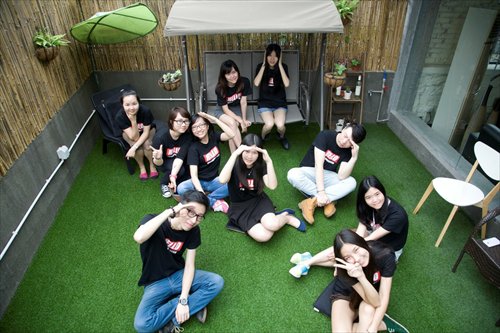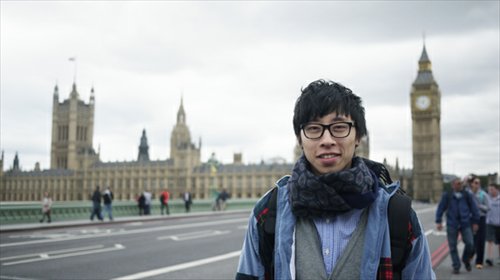HOME >> CHINA
Cai Yanqing provides creative space for others
By Liang Chen Source:Global Times Published: 2014-12-25 18:18:01

Cai Yanqing (lower left) and his team

Inset: Cai Yanqing Photo: Courtesy of Cai Yanqing
Cai Yanqing never wanted to be ordinary.When fellow 20-somethings were stuck in cubicles at work, Cai was already travelling across a dozen countries, documenting youngsters all over the world who launched NGOs dedicated to seeking for answers to tackle with poverty, environmental pollution, diseases and other social conflicts.
"Young people should never live a routine life. I wanted to document how those in other countries make their own efforts to change the society to encourage more young people in China to participate in social innovation," Cai, 29, told the Global Times.
Cai is a practitioner of social innovation himself. After returning home in Guangzhou, South China's Guangdong Province, he launched a co-working space, the "Yi-gather Community," last year. The community was the first of its kind in Guangzhou.
"The community offers rentals much cheaper than the market price, a way to offer affordable office space for young people who want to start their own business," Cai said.
However, the community offers more than just cheap rent. "The ultimate goal is that by harnessing the platform, every member can take initiative to share their resources and help each other to realize their dreams."
Now, the community, with a membership of 1,100, has become influential among young entrepreneurs in Guangzhou.
Members who pay 150 yuan ($32) per month can use the public space and facilities, and participate in all kinds of activities. Members who pay 1,500 yuan per month can maintain an exclusive desk.
As well as providing office space, the community also helped young people to build up mutual connections to inspire each other.
The community is an ideal for Cai, who is devoted to encouraging as many Chinese young people to work in the creative industries as possible. "I consider myself a communicator who can inspire more young people to participate in the social innovation," Cai told the Global Times.
Born to be different
Born in 1986, Cai majored in social service at college. He worked at a local IT company as an interactive designer after graduation. He always kept an eye on "how to change the imperfect world through my own skills."
Cai thought about doing something routine, like participating in some NGOs and working as volunteers, or donating money and clothes for the disadvantaged. But he wanted more.
"I was obsessed with unlimited possibility and creativity… Plus, I longed for a gap year, so I decided to take a world tour focusing on the issue of social innovation," he said.
In 2012, he quit his job and spent over a year and a half on interviewing entrepreneurs and social innovators all over the world, recording how they use creativity to solve social problems and make a better world. He travelled to a dozen countries, interviewing people who were involved in environmental-protection, education, resources, healthcare and art.
Money was the big difficulty. He realized that he cannot rely on savings or financial support from his parents to complete the journey, and instead turned to the public. He posted a project on dreamore.com, a crowd-funding website and collected over 40,000 yuan from over 200 sponsors.
To make sure money is spent properly, he seldom stayed in hotels, but mainly relied on couch-surfing arrangements made through online networks.
He managed to arrange the trip on his own, which he said was overwhelming. Communication difficulties in foreign languages were one issue but the feeling of loneliness while living a vagabond life was another problem. This loneliness sharpened his eyes and broadened his vision.
Across Africa, he was fascinated by the idea of social innovation community where local NGOs and start-ups can share the office and social resources in order to achieve bigger goals.
"I came to realize my responsibility was to be creative in stimulating people to create innovation," Cai said, noting how important innovation is for the country.
Mutual space
After returning from the journey, Cai and his friends rent a place and launched Yi-gather community.
In a factory-turned-office in downtown area of Guangzhou, dozens of young people flooded into the office.
But the atmosphere is more like a café. Fragrant smell of coffee reverberated in the air. People, mostly young, use every corner of the space. In the nearly 200-sqaure-meter area, some huddle on the sofa, some tap their keyboards in front of the desk, while some hold meetings in the see-through meeting room.
People can enjoy coffee, free Wifi, and use meeting rooms after reservation. On the entrance, photos of members, workshops, and notification of lectures, were hung on the wall.
"We hope people not only come to work, but for communication. It is a free market for people to exchange their ideas. They might be people who have interest in the project, professionals, or fans, but as long as they can come together at the community, they could help each other to achieve something," Cai said.
Each week, Cai would use his social connection to invite talented people from all aspects to give lectures on social innovation. Workshops were also held to tackle with specific problems when running a project.
Currently, there are dozens of small-sized companies and NGOs, mostly involved in technology and Internet, art design and social innovation.
"Cai and his community has somehow inspired us, reminding us of keeping up to social innovation work and never give up," Liu Yingzhang, founder of a local NGO dedicated to helping local poor families by helping them transform the spaces they live in, and a member of the Yi-gather community, told the Global Times.
Liu said Cai's work team and his community has helped them to overcome difficulties, by holding diversified workshops and activities.
There are several similar co-working places in other provinces and cities in China, but most of those places purely rent out their space, without offering any further services, Liu said.
Cai and his partners have invested over one million yuan, believing the community will make profits eventually. So far, the community has failed to make a profit, because the membership fee is far from enough to sustain its operation.
But Cai and his partners are not in a hurry to get economic returns. "In the long run, we hope the community can achieve commercial success, but now, the top priority is to make sure of its public interests, so that people can stick with our community and stay loyal to us," Cai said.
Yi-gather has become well-known among local entrepreneurs who wanted to do something different, and Cai has been invited to open branches in several other cities in East China. The venture capital also paid attention to the value of the offline community and some are keeping an eye on Yi-gather.
Cai differentiates the community from business incubator centers that are mostly driven by commercial profits. "We wanted to make the community for people to find the value of each other, they can make contribution to the overall development of the community," Cai said.
Newspaper headline: Shared space
Posted in: Profile,